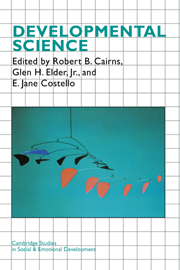Book contents
- Frontmatter
- Contents
- List of Contributors
- Foreword
- Acknowledgments
- Developmental Science:A Collaborative Statement
- 2 Developmental Science: Toward a Unified Framework
- 3 Human Lives in Changing Societies: Life Course and Developmental Insights
- 4 Developmental Psychobiological Theory
- 5 The Question of Continuity and Change in Development
- 6 Primates and Persons: A Comparative Developmental Understanding of Social Organization
- 7 Cognitive Development
- 8 Early Social-Communicative Development: Illustrative Developmental Analyses
- 9 Developmental Psychopathology
- 10 Culture and Cognition in Developmental Perspective
- 11 The Making of Developmental Science
- References
- Author Index
- Subject Index
9 - Developmental Psychopathology
Published online by Cambridge University Press: 09 November 2009
- Frontmatter
- Contents
- List of Contributors
- Foreword
- Acknowledgments
- Developmental Science:A Collaborative Statement
- 2 Developmental Science: Toward a Unified Framework
- 3 Human Lives in Changing Societies: Life Course and Developmental Insights
- 4 Developmental Psychobiological Theory
- 5 The Question of Continuity and Change in Development
- 6 Primates and Persons: A Comparative Developmental Understanding of Social Organization
- 7 Cognitive Development
- 8 Early Social-Communicative Development: Illustrative Developmental Analyses
- 9 Developmental Psychopathology
- 10 Culture and Cognition in Developmental Perspective
- 11 The Making of Developmental Science
- References
- Author Index
- Subject Index
Summary
One stimulus to the growth of developmental science has been the hope that understanding the patterns of “normal” human development will help us understand, and perhaps treat, abnormal developmental patterns. For example, in a report (1990) to the U.S. Congress, National Plan for Research on Child and Adolescent Mental Disorders, the National Advisory Mental Health Council stated that “the different rates of development of various brain systems may be related to the ages at which the symptoms of major mental disorders appear, and may offer clues to the causes of these disorders.” This finding is put forward as a reason for the National Institute of Mental Health to support basic developmental research. It is equally possible, however, to argue the converse: that studying abnormal development may help us understand the basic principles of human development. For example, one result of Binet's efforts to find a way of identifying children in need of special education was to refine the concept of intelligence, and much basic research in anatomy and physiology was the work of physicians intent on learning how the body functioned so that they could cure its ills. For many developmentalists, the need to understand so as to intervene is at least part of what drives them on.
Thus a chapter on psychopathology is not out of place in a volume on developmental science. It provides an opportunity to examine the usefulness of developmental science's taking a developmental approach to the causes, the course, and the care of psychiatric problems.
- Type
- Chapter
- Information
- Developmental Science , pp. 168 - 189Publisher: Cambridge University PressPrint publication year: 1996
- 5
- Cited by



